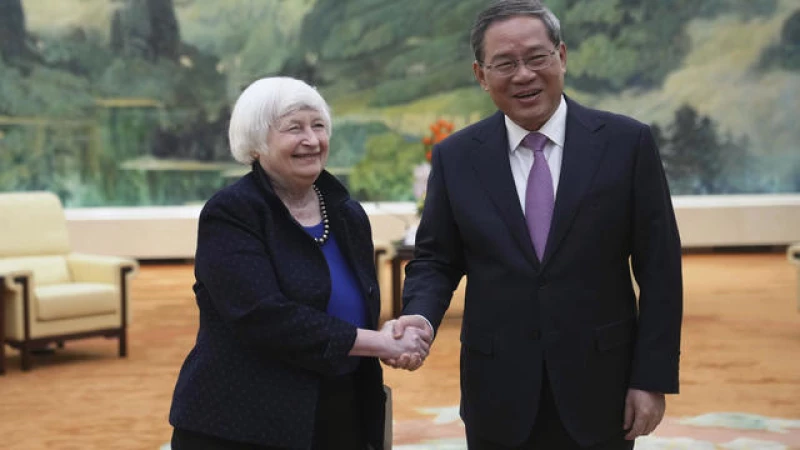Following four days of talks with Chinese officials, Treasury Secretary Janet Yellen announced that the Biden administration is urging China to revise an industrial policy that poses a threat to U.S. jobs.
Yellen mentioned that there were "difficult conversations" regarding national security, including concerns about Chinese companies supporting Russia in the conflict in Ukraine.
The main focus of the discussions was on industrial policy and addressing what the U.S. and Europe view as manufacturing overcapacity in China. There are concerns that an influx of low-cost Chinese exports could flood global markets, potentially displacing domestic manufacturers and leading to job losses.
Despite these challenges, Yellen emphasized the importance of maintaining a "healthy economic relationship with China."
She stated, "The United States does not seek to decouple from China. Our economies are deeply interconnected, and a complete separation would have detrimental effects on both nations."
Yellen also highlighted the rapid growth in the manufacturing of electric vehicles, batteries, and solar energy equipment, which are sectors the U.S. government aims to support domestically. She pointed out that Chinese government subsidies have played a significant role in driving the expansion of production in these areas.
On the other hand, China recently lodged a complaint with the World Trade Organization, alleging that the Inflation Reduction Act signed by President Joe Biden distorts fair competition due to its subsidies for electric vehicles.
"China's capacity has become too large for the global market to absorb. The actions of China can have a significant impact on world prices," Yellen stated, emphasizing the potential consequences of flooding the global market with cheap Chinese products on American and foreign firms.
The U.S. plans to hold discussions with Chinese officials in their fourth economic and financial working group meetings next week to address these issues in detail.
Xi Jinping's objectives
In September of last year, the U.S. and China established working groups to alleviate tensions and strengthen relations between the two countries. The upcoming talks will coincide with the IMF and World Bank Spring Meetings.
China's response to calls for policy shifts remains uncertain. Despite repeated discussions on the matter during European officials' visits to China, there has been no indication of change from the Chinese side. Leader Xi Jinping's focus on strengthening the nation to resist external pressure complicates the situation.
However, China also faces challenges due to overcapacity, particularly in the electric vehicle sector where price wars may force some manufacturers out of business. Experts emphasize the need for better policy coordination to support new technologies. During discussions with U.S. Treasury Secretary Yellen, both sides agreed to initiate talks on achieving "balanced growth."
Yellen, speaking at a press conference in the U.S. ambassador's residence in Beijing, highlighted the importance of China shifting its policies. She advocated for increased consumer spending in response to significant government subsidies in industries like solar, electric vehicles, and lithium-ion batteries, suggesting that higher consumer spending could reduce the need for extensive investments in green energy production.
Impact of Low-cost Chinese Steel
Xinhua News Agency reported that China addressed concerns regarding production capacity during discussions between Yellen and Vice Premier He Lifeng, who oversees China-U.S. economic and trade affairs.
More than ten years ago, the Secretary of the Treasury expressed concerns about the impact of "below-cost Chinese steel" on industries worldwide, including in the United States. He emphasized that President Biden and himself are committed to preventing a similar situation from occurring again.
Regarding the conflict in Ukraine, Yellen issued a warning that any banks involved in facilitating the sale of military or dual-use goods to Russia could potentially face sanctions from the United States.
She further stated, "I emphasized the importance of companies, including those in China, refraining from providing support to Russia's war efforts, as there will be serious repercussions for those who do."
Russian Foreign Minister Sergey Lavrov traveled to Beijing for discussions on the Ukraine crisis and other related matters.
When asked about Yellen's statements, Chinese Foreign Ministry Spokesperson Mao Ning urged the U.S. to not undermine the normal relations between China and Russia and to respect the legitimate rights and interests of Chinese entities.
Yellen, who previously served as the Chair of the Federal Reserve, held a meeting with the Governor of the People's Bank of China, Pan Gongsheng, earlier in the day.







